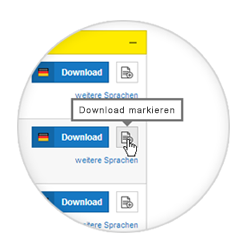5/7/2024
Robots support production
VEGA expands its innovative intralogistics concept with an automation solution
Sven Schmieder (left) and Nelson Da Costa Mira, logistics assistants at VEGA, are delighted with the support provided by the SOTO robot.
A few years ago, VEGA began modernising the company’s entire logistics and set up a separate department for this purpose in 2019: Intralogistics. One important component of the new concept: the self-driving robot SOTO. For several months already it has been supporting the production processes of the level, switching and pressure instrument maker.
How did the autonomous robot come to be used?
“During the modernisation process, the material flow within VEGA was restructured,” explains Intralogistics manager Manuel Ernst. “The self-driving robot played an important role in project.” To get the ball rolling, VEGA started working together with the Munich-based tech start-up Magazino, which has since been acquired by intralogistics specialist Jungheinrich. At the time, the start-up already had a much smaller robot in use at a large German online mail order company. Because VEGA has to transport boxes much larger and heavier than just shoe boxes, a larger robot was needed: SOTO.
What does the mobile robot do?
SOTO is used in the production areas. It brings boxes containing individual sensor parts from the high-bay warehouse to the appropriate production line. The robot can carry up to 16 material containers at the same time. This relieves the logistics staff of a lot of work. “Especially work that requires heavy lifting, for example,” explains Brigitte Sum, deputy head of Intralogistics. So it’s not only the modernised workplaces in production, designed with ergonomics in mind, that protect the health of employees – SOTO does too.
What preparations were required?
“Some preparatory work was necessary before SOTO could start its work,” says technical logistics assistant Nelson da Costa Mira. For example, wide pathways had to be created that would allow the robot to travel without impediment. Container sizes had to be selected which were suitable for both SOTO and the production processes. Besides that, a new form of communication between VEGA’s internal operating system and the robot had to be invented.
How has the interaction between man and machine worked out?
“Really well – the production staff and the robot have gotten used to each other and now function as a perfect team.” Digital requests for material from the high-bay warehouse, which SOTO then brings to the production line, work very reliably. The robot moves safely along the aisles that it shares with human employees as well as various transport trolleys and hand pallet trucks. It is equipped with a large number of sensors, enabling it to register its surroundings and react immediately to anything that gets in its way. SOTO slows down or comes to a complete stop if the situation requires it. “Safety always comes first,” emphasizes Intralogistics manager Manuel Ernst.
Will there always be just one robot?
“No,” he tells us. By mid-2025, the fleet is expected to grow by two more robots of the same model – thus further improving production processes.



Close